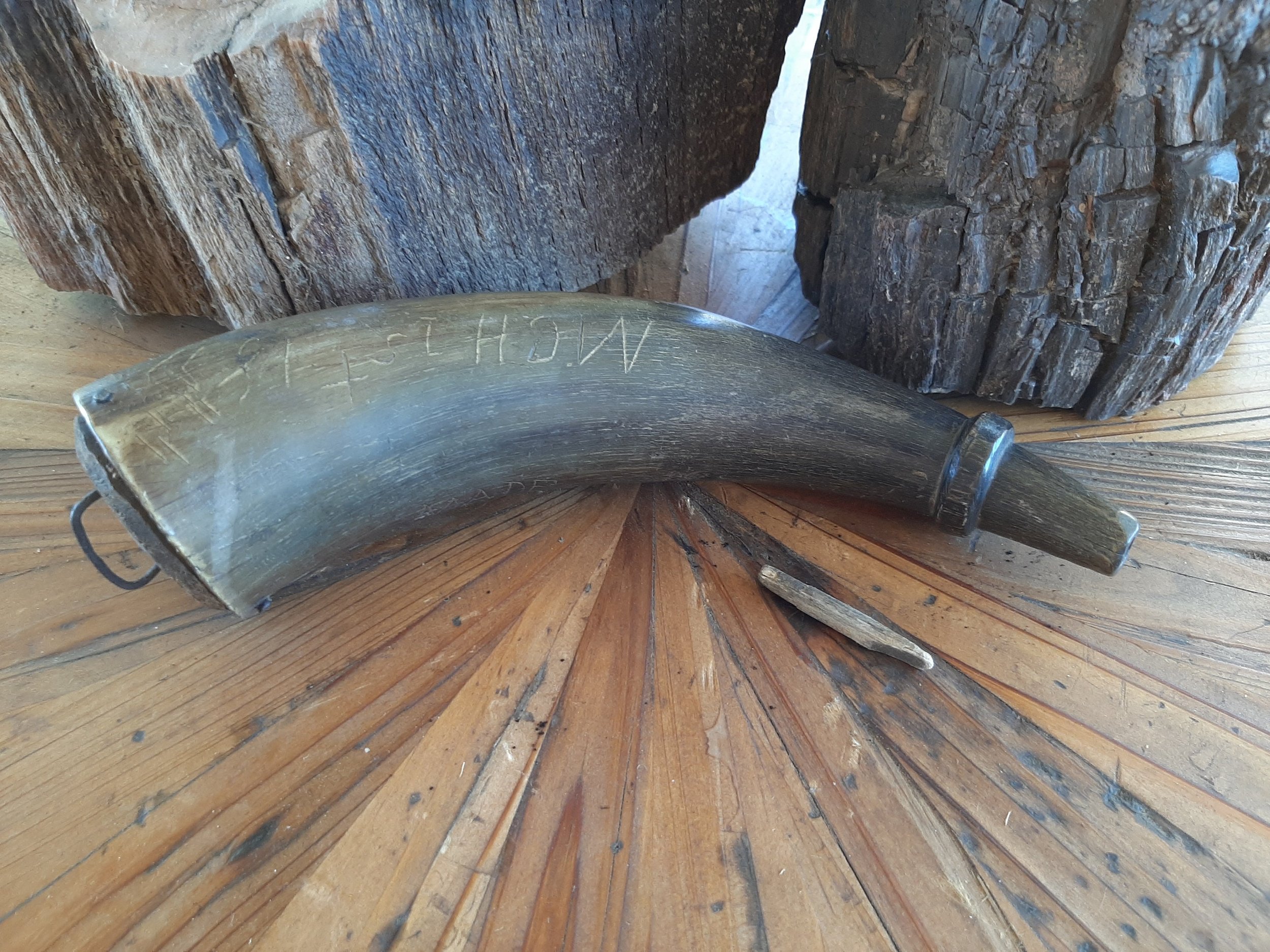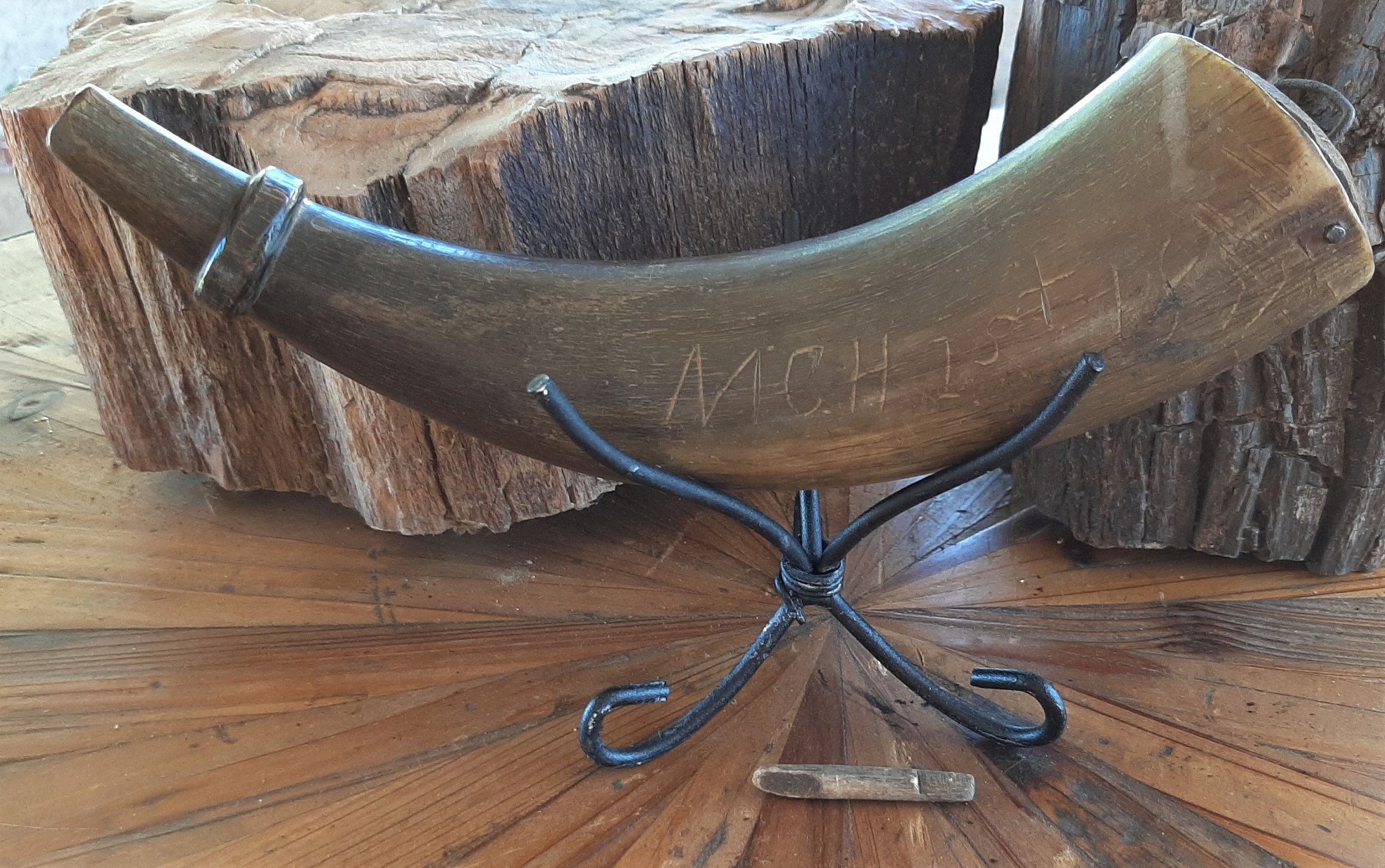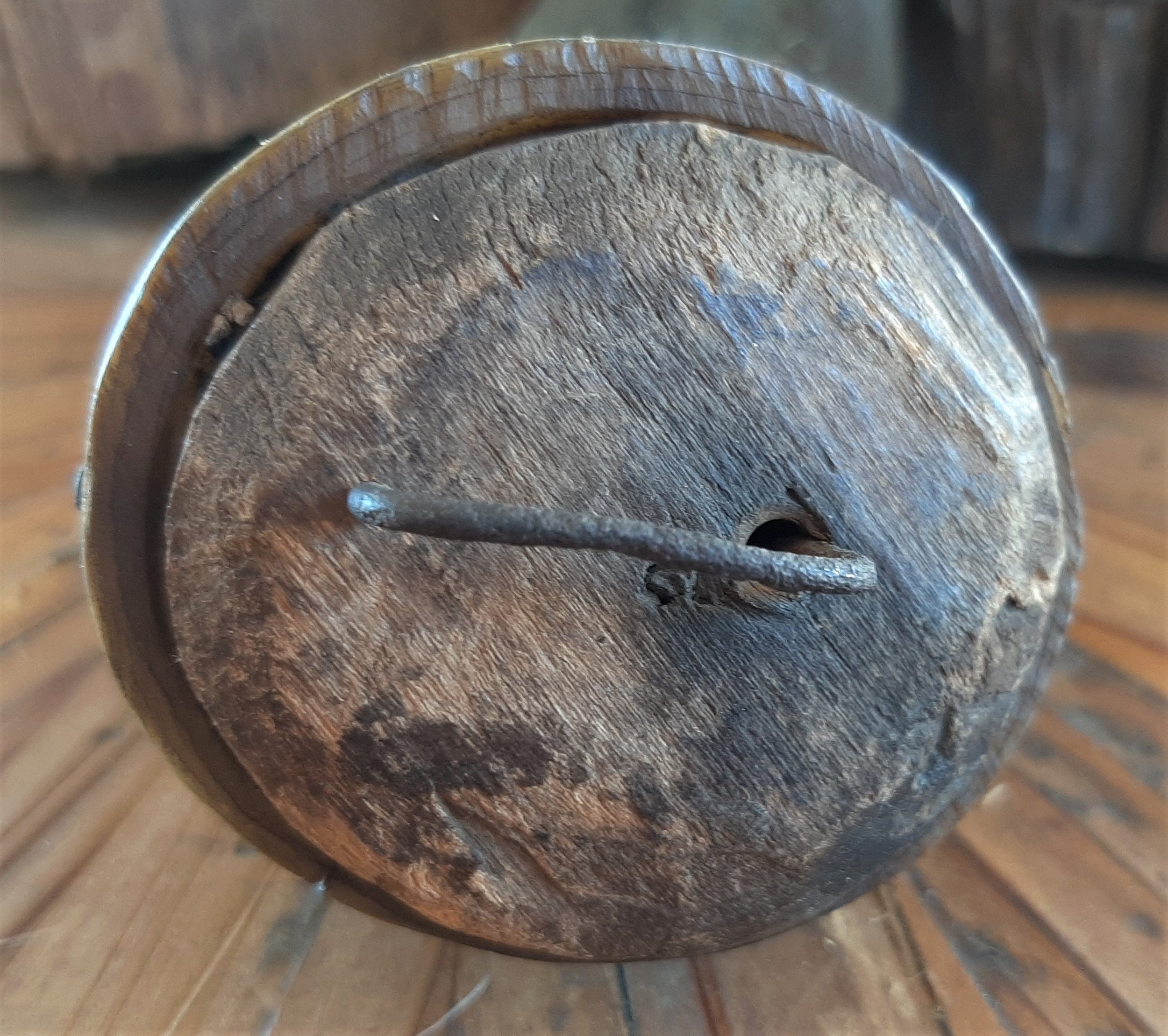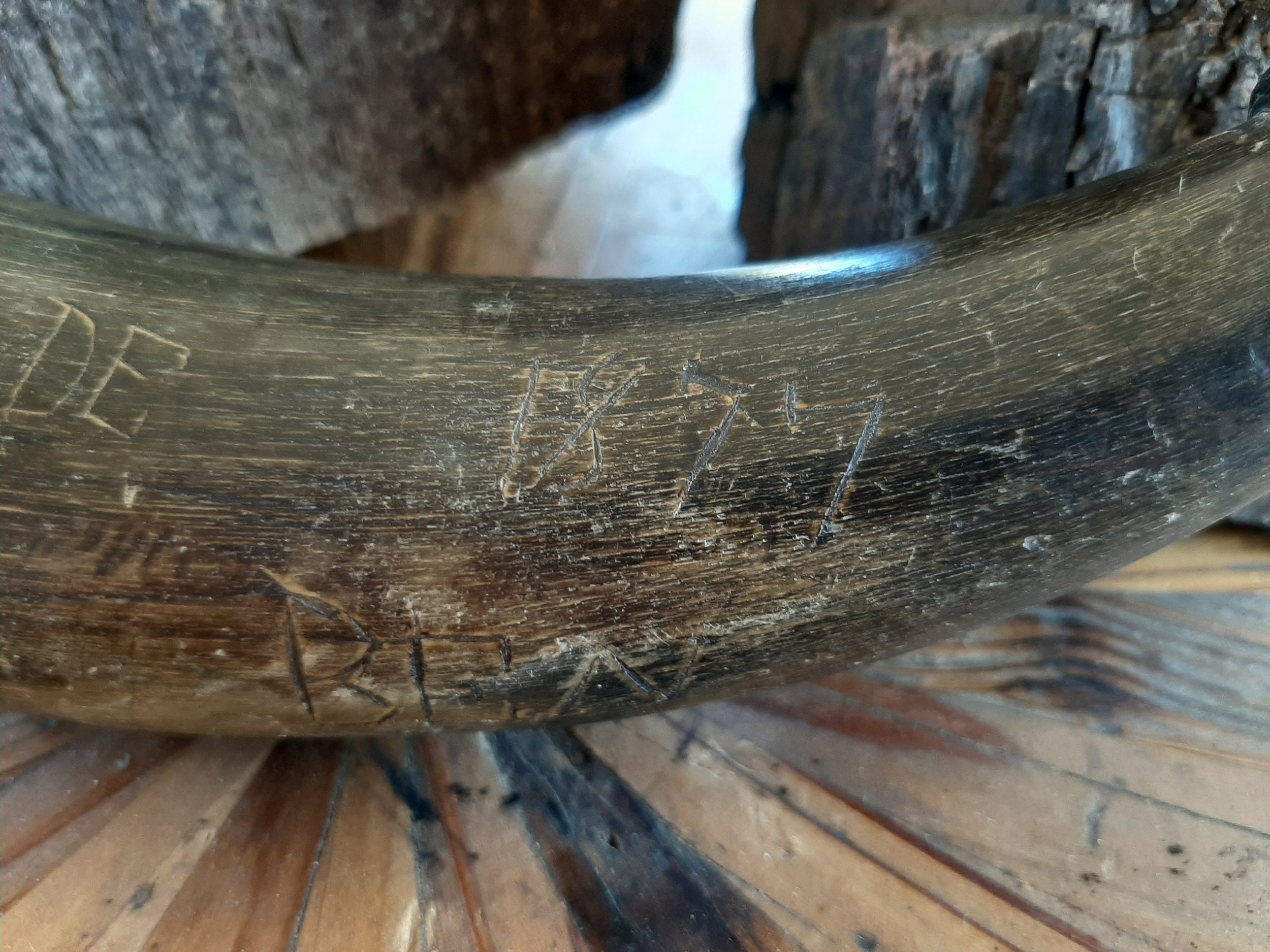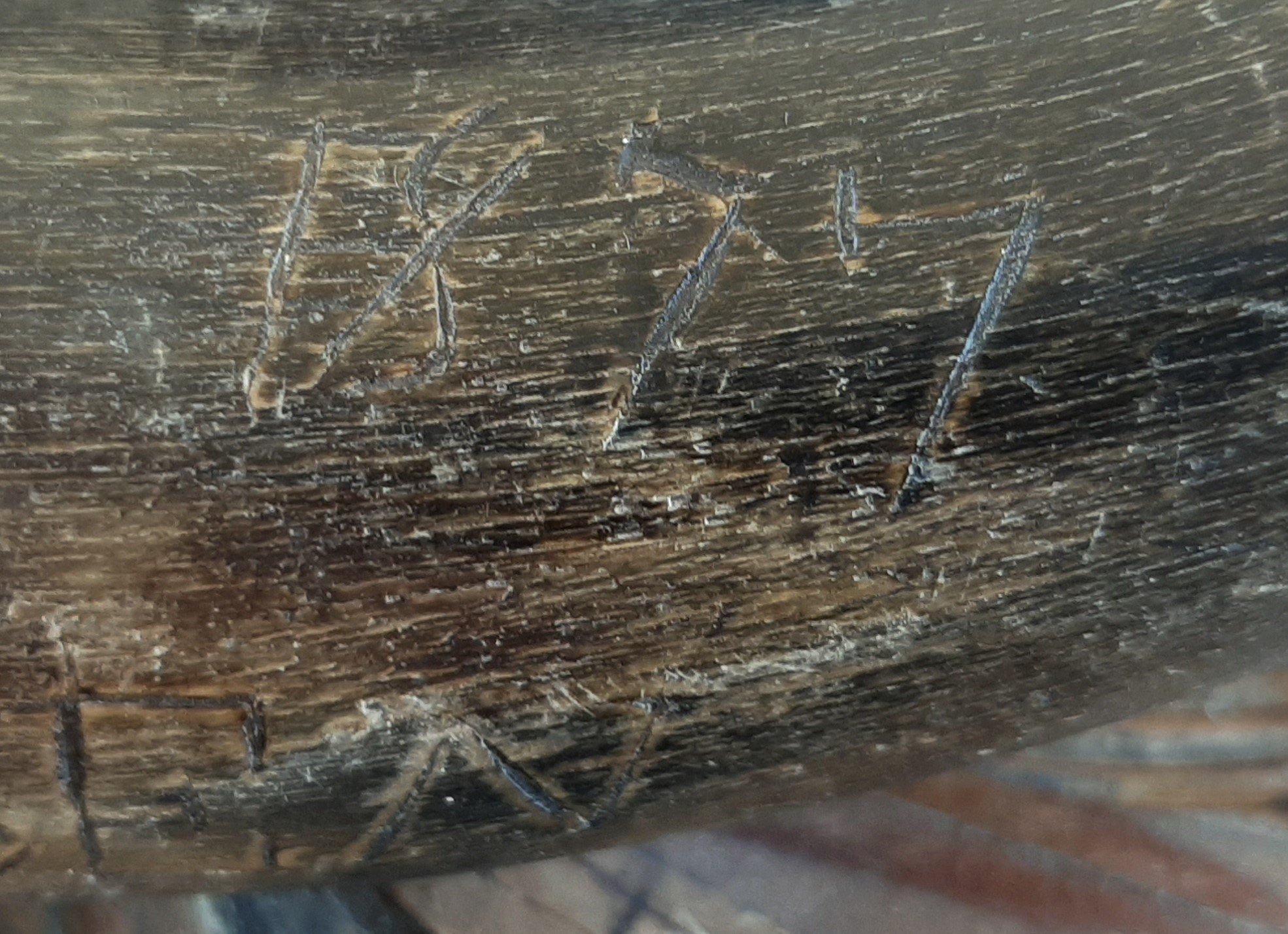Black Powder Horn, Owner/Carver Signed and dated 1877, American Reconstruction Period
This horn, meticulously carved by its owner during a pivotal chapter in American history, speaks volumes about the era it represents. In 1876, the nation found itself embroiled in one of the most controversial elections to date, as Rutherford B. Hayes claimed the presidency despite losing the popular vote. Hayes’ victory, determined by a narrow margin of electoral votes and a contentious ruling by Congress, culminated in the Compromise of 1877. This landmark agreement not only resolved the electoral standoff but also ignited the end of Reconstruction, marking a significant shift in the political landscape of the American South.
The engraved initials “MCH” alongside the date of March 4, 1877, indicate the distinct moment when Hayes formally ended Reconstruction, an event shaping the nation’s socio-political future. The artistry displayed in the horn’s crude lettering suggests a creator who, while lacking the polish of high society, possessed a meaningful grasp of education and artistry. The carver, Ben Chestnut, remains an enigmatic figure—his identity cloaked in anonymity, yet his work echoes the sentiments of a turbulent time.
As Hayes attempted to mend the rifts that left deep scars from the Civil War and the Reconstruction Era, he championed ideals of civil service reform and equality in treatment, regardless of race. His presidency was marked by aspirations for a more just society, albeit tumultuous as it was. Following his departure, the brief presidency of James Garfield, cut tragically short by an assassin's bullet, serves as a reminder of the fragile nature of progress during this period.
This horn, a vessel echoing the era's complexities, invites us to ponder its past. One can only imagine the stories and historical moments it has witnessed, each curve and engraving a testament to the resilience and strife of a nation in search of its identity.
The horn is 9 inches long not accounting for the curvature of the horn. The end cap is a oblong shape and 2 1/4 inches across at the widest point. The plug works and appears to be original. The end cap and hardware also appear to be original. The piece has a wonderful aged patina and the horn is solid with no cracks or breaks. Please see pictures for better perspective.
As always, thank you for stopping by the shop and for your interest in this piece. Please do not hesitate to contact us with any questions you might have.
This horn, meticulously carved by its owner during a pivotal chapter in American history, speaks volumes about the era it represents. In 1876, the nation found itself embroiled in one of the most controversial elections to date, as Rutherford B. Hayes claimed the presidency despite losing the popular vote. Hayes’ victory, determined by a narrow margin of electoral votes and a contentious ruling by Congress, culminated in the Compromise of 1877. This landmark agreement not only resolved the electoral standoff but also ignited the end of Reconstruction, marking a significant shift in the political landscape of the American South.
The engraved initials “MCH” alongside the date of March 4, 1877, indicate the distinct moment when Hayes formally ended Reconstruction, an event shaping the nation’s socio-political future. The artistry displayed in the horn’s crude lettering suggests a creator who, while lacking the polish of high society, possessed a meaningful grasp of education and artistry. The carver, Ben Chestnut, remains an enigmatic figure—his identity cloaked in anonymity, yet his work echoes the sentiments of a turbulent time.
As Hayes attempted to mend the rifts that left deep scars from the Civil War and the Reconstruction Era, he championed ideals of civil service reform and equality in treatment, regardless of race. His presidency was marked by aspirations for a more just society, albeit tumultuous as it was. Following his departure, the brief presidency of James Garfield, cut tragically short by an assassin's bullet, serves as a reminder of the fragile nature of progress during this period.
This horn, a vessel echoing the era's complexities, invites us to ponder its past. One can only imagine the stories and historical moments it has witnessed, each curve and engraving a testament to the resilience and strife of a nation in search of its identity.
The horn is 9 inches long not accounting for the curvature of the horn. The end cap is a oblong shape and 2 1/4 inches across at the widest point. The plug works and appears to be original. The end cap and hardware also appear to be original. The piece has a wonderful aged patina and the horn is solid with no cracks or breaks. Please see pictures for better perspective.
As always, thank you for stopping by the shop and for your interest in this piece. Please do not hesitate to contact us with any questions you might have.
This horn, meticulously carved by its owner during a pivotal chapter in American history, speaks volumes about the era it represents. In 1876, the nation found itself embroiled in one of the most controversial elections to date, as Rutherford B. Hayes claimed the presidency despite losing the popular vote. Hayes’ victory, determined by a narrow margin of electoral votes and a contentious ruling by Congress, culminated in the Compromise of 1877. This landmark agreement not only resolved the electoral standoff but also ignited the end of Reconstruction, marking a significant shift in the political landscape of the American South.
The engraved initials “MCH” alongside the date of March 4, 1877, indicate the distinct moment when Hayes formally ended Reconstruction, an event shaping the nation’s socio-political future. The artistry displayed in the horn’s crude lettering suggests a creator who, while lacking the polish of high society, possessed a meaningful grasp of education and artistry. The carver, Ben Chestnut, remains an enigmatic figure—his identity cloaked in anonymity, yet his work echoes the sentiments of a turbulent time.
As Hayes attempted to mend the rifts that left deep scars from the Civil War and the Reconstruction Era, he championed ideals of civil service reform and equality in treatment, regardless of race. His presidency was marked by aspirations for a more just society, albeit tumultuous as it was. Following his departure, the brief presidency of James Garfield, cut tragically short by an assassin's bullet, serves as a reminder of the fragile nature of progress during this period.
This horn, a vessel echoing the era's complexities, invites us to ponder its past. One can only imagine the stories and historical moments it has witnessed, each curve and engraving a testament to the resilience and strife of a nation in search of its identity.
The horn is 9 inches long not accounting for the curvature of the horn. The end cap is a oblong shape and 2 1/4 inches across at the widest point. The plug works and appears to be original. The end cap and hardware also appear to be original. The piece has a wonderful aged patina and the horn is solid with no cracks or breaks. Please see pictures for better perspective.
As always, thank you for stopping by the shop and for your interest in this piece. Please do not hesitate to contact us with any questions you might have.
